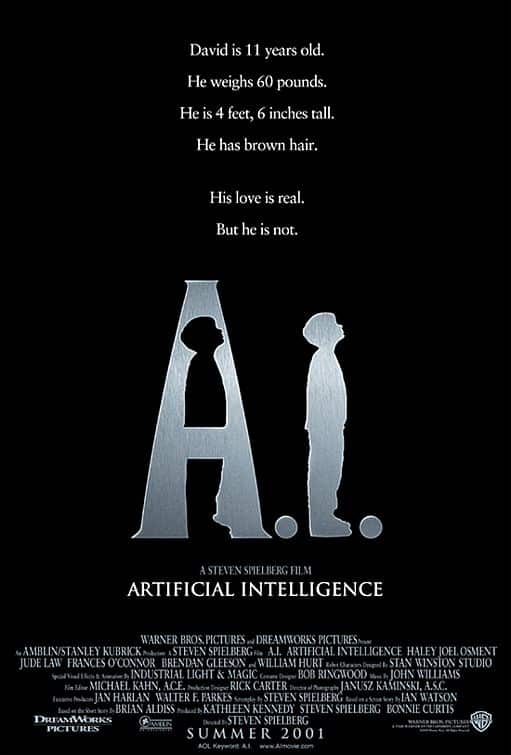
- Starring
- Haley Joel Osment, Jude Law, William Hurt
- Writer
- Steven Spielberg
- Director
- Steven Spielberg
- Rating
- 14A (Canada), PG-13 (United States)
- Running Time
- 146 minutes
Overall Score
Rating Summary
Daddy issues are a theme that pop up in so many Steven Spielberg films, so it was surprising to see that AI Artificial Intelligence has so much to say about the demands that are placed upon mothers and the limited understanding that children have of their parents. He almost seems to be going back and providing a rebuke to the depictions of incredibly loving, endlessly devoted mothers in his previous films.
Some dismissed this film as an overly sappy at the time of its release and complained that Steven Spielberg, a mere commercial filmmaker, was unable to capture the bleakness of the vision of Stanley Kubrick, a true artiste. The latter had been developing the idea for this film for years and handed the project over to Spielberg when he felt that he could not make the film without having access to more advanced technology. One can notice a lot of Kubrick’s preoccupations within the story, but this film arguably becomes truly special because Spielberg introduces a streak of Freudian hysteria to the story that feels much needed. We savor something like this because it feels so rare, and, even though it has a couple of flaws, it’s lazy to argue that Spielberg sanded all of the rough edges off of something that remains deeply troubling and upsetting.
Centrally, AI Artificial Intelligence seems to be about the imperfection of love and the horror of obsessive, never-ending love. It opens in a world in which robots, known as ‘Mechas’, serve various functions and have begun to overpopulate humans. Professor Hobby (Hurt) is a doctor who decides to create the first robot that both resembles a human child and can be programmed to feel love for the people around them. This new robot comes to be known as David (Osment) and he is given to a woman named Monica Swinton (Frances O’Connor) and her husband Henry (Sam Robards) in order to replace their severely ill son Martin (Jake Thomas). Monica imprints on David and he becomes obsessed with gaining her love and being the perfect son. She is made uncomfortable by his obedience and adoration and decides to abandon him in the woods. Despite this, he remains as determined as ever to get back to her and make her love him.
There are so many plot beats that feel recycled from Close Encounters and the Third Kind and E.T. the Extra-Terrestrial, but they take on a completely different tone when considering the fact that all of the ‘emotion’ is drained out of these experiences. Everything that David feels is synthetic and he does not care about authenticity. When he finally has his perfect day and gets to obediently serve a fake version of his mother, who has completely lost her humanity, he is able to complete the function that he has been programmed to carry out. In the final moments of the film, it seems as though he is dying, or being turned off by a new race of aliens. A few critics saw this ending as Spielberg’s attempt to turn this into something mawkish, rather than fully engaging with the thorny philosophical issues that are brought up in previous scenes. This might be true if it felt like the point of the scene was to make us treasure the beautiful bond between David and his mother. If there was the sense that they were finally forging a genuine bond and connecting on a deeper level, this might have felt like classic Spielberg sap. When it is staged like a scene from a psychological thriller, and David and Monica both have glassy-eyed expressions, it is hard to accept this as something that is not meant to be horribly distressing.
Spielberg’s focus on the family unit is still an essential part of the narrative and most of the emotion is drawn out of Monica’s complicated relationship with David. She is one of the most complex female characters to ever appear in a Spielberg film. For once, he presents a mother who is selfish, fickle, overly impulsive and deeply needy. She is creeped out by the fact that David has no real personality and exists to follow her around and try to gain her approval. Real love involves fighting with a person and having moments where one can’t stand being in their presence. If you really adore a person, you will be willing to challenge them and encourage them to make difficult decisions.
It is also much easier to form an emotional bond with somebody if they have a personality. Even if you disagree on most issues and don’t like the way that another person expresses themselves, it is easier to feel affection towards them when you can have a lively, spirited conversation with them. If they are totally subservient to you, as David is to Monica, it could become overwhelming and uncomfortable to spend time with them. David needs Monica’s love 100% of the time and as a human being, she is incapable of providing him with that. As a human being, she wants to live a more exciting life, where she feels a variety of emotions, does not serve just one purpose and doesn’t have to feel guilt for neglecting a child who cannot satisfy her needs. Her decision to abandon him is selfish, but Spielberg does extend an unusual amount of sympathy towards her. For a sci-fi film, AI Artificial Intelligence could have easily been too cold and intellectual, it is important that Monica’s arc feels profoundly moving.
A whole host of other themes are explored in the first and third acts of the story, with the threat of humans playing God really coming to the fore in the scenes that feature Hobby. This content was certainly admirable as one can’t help but be knocked out by the boundless ambition on display here. That interest did waiver as the second act saw a drop-off as a result of some superfluous set pieces. It just felt as though Spielberg needed to film scenes that could be included in the trailer, merely resulting in flashy special effects that don’t signify anything of meaning. It ends up dragging and seemed unnecessary for a film that is essentially a family drama.
If Spielberg had dispensed with all that, AI Artificial Intelligence might have been something even more extraordinary.
still courtesy of Warner Bros. Pictures
Follow me on Twitter.
If you liked this, please read our other reviews here and don’t forget to follow us on Twitter or Instagram or like us on Facebook.

I am passionate about screwball comedies from the 1930s and certain actresses from the Golden Age of Hollywood. I’ll aim to review new Netflix releases and write features, so expect a lot of romantic comedies and cult favourites.
Discover more from
Subscribe to get the latest posts sent to your email.
